| Buchhandlung Heesen | Versandbuchhandlung für Evangelische Theologie |
Impressum | |
| Freudenstadt / Loßburg | Datenschutzhinweise | ||
| Tel. 07446 952 418 1 | Buchhandlung.Heesen@t-online.de | ||
| Da unsere Angebote manuell erstellt werden und während des Seitenaufrufes keine Verbindung zu einer Buchdatenbank aufgebaut wird prüfen wir die Verkaufspreise bei Rechnungsstellung auf Richtigkeit und berechnen den gesetzlich festgelegten Buchpreis. Falls sich dadurch eine Preiserhöhung ergibt werden wir Sie vor Versand informieren, Sie können dann diesem Preis zustimmen oder vom Kauf zurücktreten. Hinweise zum Datenschutz und Cookies | |||
| Reformed Historical Theology, Vandenhoeck & Ruprecht | ||||||
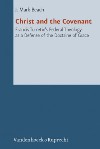 |
The series »Reformed Historical Theology/Reformierte Historische
Theologie« is edited by Herman J. Selderhuis in cooperation with Emidio
Campi, Irene Dingel, Elsie McKee, Richard Muller, Risto Saarinen, and
Carl Trueman, and publishes substantial texts in the historical theology
of Calvinism and Reformed Protestantism. It offers scholars the
possibility of presenting the results of their research to the
international academic world and seeks to stimulate research in this
field. The series accepts texts both in German and English which deal
with the wide spectrum of Reformed traditions of the Early Modern Era,
i.e., from the 16th century to the beginning of the 19th century. The
“Reformed tradition” is understood here in its broadest sense, that is,
it is not limited in a confessional meaning and includes persons and
movements that saw themselves as being Reformed. Bei Abnahme der Reihe |
|||||
| EUR | Jahr | |||||
| SB | 978-3-525-50183-2 | Christian Link |
Die Theologie Calvins im Rahmen der europäischen Reformation. Reformed
Historical Theology Beschreibung |
40,00 |
|
2021 |
| 62 | 978-3-525-52210-3 | Adriaan C. Neele |
Petrus van Mastricht (1630-1706). Text, Context, and
Interpretation zur Beschreibung |
150,00 |
|
2020 |
| 57 | 978-3-525-56461-5 | Hyonam Kim | Salvation by Faith. Faith, Covenant and the Order of Salvation
in Thomas Goodwin (1600-1680) zur Beschreibung |
120,00 |
|
2019 |
| 56 | 978-3-525-51699-7 | Thomas Klöckner | Heinrich Alting (1583-1644). Lebensbild und Bedeutung für die
reformierte Historiografie und Dogmengeschichtsschreibung des 17.
Jahrhunderts zur Beschreibung |
110,00 |
|
2019 |
| 55 | 978-3-525-57314-3 | Joseph C. Harrod | Theology and Spirituality in the Works of Samuel Davies. zur Beschreibung |
89,00 |
|
|
| 53 | 978-3-525-57061-6 | John H. Duff | A Knot Worth Unloosing. The Interpretation of the New Heavens
and Earth in Seventeenth-Century England zur Beschreibung |
95,00 |
|
2018 |
| 52 | 978-3-525-57060-9 | Kyle J. Dieleman | The Battle for the Sabbath in the Dutch Reformation.
Devotion or Desecration? zur Beschreibung |
95,00 |
|
2018 |
| 51 | 978-3-525-51641-6 | Gyeongcheol Gwon | Christ and the Old Covenant. Francis
Turretin (1623–1687) on Christ’s Suretyship under the Old Testament zur Beschreibung |
85,00 |
|
|
| 47 | 978-3-525-55283-4 | Kai-Ole Eberhardt | Christoph Wittich (1625–1687). Reformierte
Theologie unter dem Einfluss von René Descartes zur Beschreibung |
140,00 |
|
2018 |
| 46 | 978-3-525-55284-1 | Jae-Eun Park | Driven by God. Active Justification and
Definitive Sanctification in the Soteriology of Bavinck, Comrie,
Witsius, and Kuyper zur Beschreibung |
90,00 |
|
2018 |
| 41 | 978-3-525-55278-0 | Casey B. Carmichael | A Continental View: Johannes Cocceius’s
Federal Theology of the Sabbath. zur Beschreibung |
80,00 |
|
2018 |
| 38 | 978-3-525-55102-8 | Charles K. Telfer | Wrestling with Isaiah: The Exegetical Methodology of Campegius Vitringa (1659–1722). | 120,00 |
|
2016 |
| 37 | 978-3-525-55104-2 | Stefan Lindholm | Jerome Zanchi (1516–90) and the Analysis of Reformed Scholastic Christology. | 95,00 |
|
2016 |
| 36 | 978-3-525-55099-1 | Michael Baumann | Petrus Martyr Vermigli in Zürich (1556–1562). Dieser
Kylchen in der heiligen gschrifft professor und läser zur Beschreibung |
160,00 |
|
2016 |
| 35 | 978-3-525-55098-4 | John V. Fesko | The Covenant of Redemption. Origins, Development, and Reception | 120,00 |
|
2016 |
| 34 | 978-3-525-55090-8 | Andrew M. Leslie | The Light of Grace: John Owen on the Authority of Scripture and Christian Faith. | 120,00 |
|
2015 |
| 32 | 978-3-525-55086-1 | G. Stephen, Jr. Weaver | Orthodox, Puritan, Baptist. Hercules Collins (1647–1702) and Particular Baptist Identity in Early Modern England | 89,00 |
|
2015 |
| 30 | 978-3-525-55085-4 | Byung Soo Han | Symphonia Catholica. The Merger of Patristic and Contemporary Sources in the Theological Method of Amandus Polanus (1561–1610) | 140,00 |
|
2015 |
| 24 | 978-3-525-55059-5 | James E. Bruce | Rights in the Law. The Importance of God's Free Choices in the Thought of Francis Turretin | 95,00 | 2013 | |
| 23 | 978-3-525-55050-2 | Volker Leppin | Calvinismus in den Auseinandersetzungen des frühen
konfessionellen Zeitalters zur Beschreibung |
100,00 | 2013 | |
| 22 | 978-3-525-55042-7 | Jeongmo Yoo | John Edwards (1637-1716) on Human Free Choice and Divine Necessity. The Debate on the Relation between Divine Necessity and Human Freedom in Late Seventeenth-Century and Early Eighteenth-Century England | 120,00 | 2013 | |
| 21 | 978-3-525-57025-8 | Philipp Reisner | Cotton Mather als Aufklärer. Glaube und Gesellschaft im Neuengland der Frühen Neuzeit | 100,00 | 2012 | |
| 20 | 978-3-525-57022-7 | J. V. Fesko | Beyond Calvin. Union with Christ and Justification in Early Modern Reformed Theology (1517-1700) | 140,00 | 2012 | |
| 19 | 978-3-525-56947-4 | Frank Ewerszumrode | Mysterium Christi spiritualis praesentiae. Die Abendmahlslehre des Genfer Reformators Johannes Calvin aus römisch-katholischer Perspektive | 100,00 | 2012 | |
| 18 | 978-3-525-56946-7 | Herman J. Selderhuis | Calvinus clarissimus theologus. Papers of the Tenth International Congress on Calvin Research | 150,00 | 2012 | |
| 17 | 978-3-525-56945-0 | Michael A. G. Haykin | Drawn into Controversie. Reformed Theological Diversity and Debates Within Seventeenth-Century British Puritanism | 140,00 | 2011 | |
| 16 | 978-3-525-56944-3 | Arnold Huijgen | Divine Accommodation in John Calvin's Theology. Analysis and Assessment | 140,00 | 2011 | |
| 15 | 978-3-525-56939-9 | Robert J. McKelvey | Histories that Mansoul and
Her Wars Anatomize. The Drama of Redemtion in John Bunyan's Holy War Leseprobe |
150,00 | 2011 | |
| 14 | 978-3-525-56908-5 | William de Boer | God's Twofold Love. The Theology of Jacob Arminius (1559-1609) | 140,00 | 2010 | |
| 13 | 978-3-525-56905-4 | Mark Jones | Why Heaven Kissed Earth. The
Christology of the Puritan Reformed Orthodox theologian, Thomas Goodwin
(1600-1680) zur Beschreibung |
120,00 | 2010 | |
| 12 | 978-3-525-56922-1 | Frederik A. V. Harms | In God's Custody: The Church, a History of Divine Protection. A Study of John Calvin's Ecclesiology based on his Commentary on the Minor Prophets | 110,00 | 2010 | |
| 11 | 978-3-525-56918-4 | Jason Van Vilet | Children of God. The Imago Dei in John Calvin and His Context | 150,00 | 2009 | |
| 10 | 978-3-525-56870-5 | Nam Kyu Lee | Die Prädestinationslehre der Heidelberger
Theologen 1583-1622. Georg Sohn (1551-1589), Herman Rennechenus
(1550-?), Daniel Tossanus (1541-1602) zur Beschreibung |
140,00 | 2010 | |
| 9 | 978-3-525-56919-1 | Marco Hofheinz | Calvins Erbe. Beiträge zur
Wirkungsgeschichte Johannes Calvins zur Beschreibung |
120,00 | 2011 | |
| 8 | 978-3-525-56920-7 | Aaron C. Denlinger | Omnes in Adam ex pacto Dei. Ambrogio Catarino's Doctrine of Covenantal Solidarity and Its Influence on Post-Reformation | 140,00 | 2010 | |
| 7 | 978-3-525-56913-9 | Brian J. Lee | Johannes Cocceius and the Exegetical Roots of Federal Theology. Reformation Developments in the Interpretation of Hebrews 7-10 | 79,00 | 2009 | |
| 6 | 978-3-525-56915-3 | Wilhem H. Neuser | Johannes Calvin – Leben und
Werk in seiner Frühzeit 1509-1541 zur Beschreibung |
81,95 | 2009 | |
| 5 | 978-3-525-56914-6 | Herman J. Selderhuis | Calvinus sacrarum literarum interpres. Papers of the
International Congress on Calvin Research zur Calvin Seite |
120,00 | 2008 | |
| 4 | 978-3-525-56916-0 | Jason Zuidema | Peter Martyr Vermigli (1499–1562) and the Outward Instruments of Divine Grace. | 110,00 | 2008 | |
| 3 | 978-3-525-56912-2 | Tobias Sarx | Franciscus Junius d. Ä. (1545-1602). Ein reformierter Theologe im
Spannungsfeld zwischen späthumanistischer Irenik und reformierter
Konfessionalisierung zur Beschreibung |
85,00 | 2007 | |
| 2 | 978-3-525-56910-8 | Cornelis P. Venema | Accepted and Renewed in Christ. The Twofold Grace of God and the
Interpretation of Calvin's Theology zur Calvin Seite |
85,00 | 2007 | |
| 1 | 978-3-525-56911-5 | Mark Beach | Christ and the Covenant. Francis Turretin’s Federal Theology as a Defense of the Doctrine of Grace | 95,00 | 2007 | |
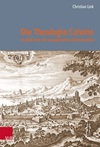 |
Christian Link Die Theologie Calvins im Rahmen der europäischen Reformation Vandenhoeck & Ruprecht, 2021, 414 Seiten, Gebunden, 978-3-525-50183-2 40,00 EUR |
Reformed Historical Theology
Sonderband Der Versuch einer Gesamtdarstellung des theologischen Werkes Calvins ist seit der ersten Hälfte des 20. Jahrhunderts nicht mehr unternommen worden. Das Jubeljahr 2009 hat eine Fülle ausgezeichneter Einzel- studien und Sammelwerke besonders auf dem Gebiet der biographischen und historischen, zum Teil auch der systematischen Forschung hervorgebracht. Doch die Interessen der älteren Forschung ließen sich damit nicht befriedigen. Damals fragte man: Gibt es eine "Mitte", eine Art Gravitationszentrum seiner Theologie, vergleichbar der Rechtfertigungslehre im Luthertum, um das sich die Themen und Perspektiven seiner Theologie gruppieren ließen? Von der Abendmahlslehre lässt sich das nicht sagen. Auch die Suche nach einem "Central-dogma" (Alexander Schweizer), einer Art "Materialprinzip", hat sich als ein Irrweg erwiesen. Der Schluss liegt nahe, dass schon die Frage nach einem solchen einheitstiftenden Prinzip oder Schlüssel falsch gestellt sein könnte, sich jedenfalls nicht mit der Angabe eines inhaltlichen Elementes oder Problems seiner Theologie beantworten lässt. An dieser Erwartung jedenfalls sollte man Calvin nicht länger messen. Auf sehr viel sichererem Boden steht man, wenn man sich, auch systematisch fragend, an die von ihm selbst aus seinen exegetischen Arbeiten hervorgegangenen Gliederungsgesichtspunkte der Institutio hält. Da ist zweimal pointiert von der Erkenntnis Gottes (aus der Natur und aus der Schrift) die Rede, sodann von der subjektiven Aneignung dieser Erkenntnisse im christlichen Leben und schließlich, gleichsam als Konvergenzpunkt des Ganzen, von der schriftgemäßen Verfassung der Kirche, die der Ort der Bewährung jener Erkenntnisse sein sollte. Von diesem Zielpunkt aus und auf ihn bezogen steht das Erkenntnisproblem - konkret:die möglichst genaue Textinterpretation - im Zentrum der vorliegenden Arbeit. Dabei meint Erkenntnis nicht das theoretische Verhalten des modernen Zuschauers, sondern setzt dessen Einbezogensein, sein "Mitspielen", also seine verantwortliche Teilnahme an der Schöpfung, an dem Prozess der Versöhnung und am Weg der Kirche voraus. Denn die biblische Voraussetzung, dass er, der Mensch, es in jeder Lebenslage mit dem lebendigen Gott zu tun hat und von ihm auf den Weg gesetzt wird, ist der eigentliche Lebensnerv des calvinischen Unterrichts. |
 |
Adriaan C. Neele Petrus van Mastricht (1630-1706) Text, Context, and Interpretation Vandenhoeck & Ruprecht, 2020, 252 Seiten, Hardcover, 978-3-525-52210-3 150,00 EUR |
Reformed Historical Theology
Volume 62 Petrus van Mastricht (1630–1706): Text, Context, and Interpretation »is not just a statement of the state of the art on Mastricht studies. It also points the way forward for further exploration of Mastricht's thought and the history of Reformed Orthodoxy in general« from the Preface by Carl R. Trueman.This volume presents collected essays from scholars around the world on various aspects of Petrus van Mastricht (1630-1706) theology, philosophy, and reception in the context of the challenges of orthodoxy in his day. This book, then, locates Mastricht's ideas in the context of the theological and philosophical currents of his day. The pre-Revolutionary status of theology and philosophy in the wake of the Enlightenment had many of the same problems we see in theology today as relating to the use and appropriation of classical theology in a 21st-century context. Ideas about the necessity of classical primary sources of Christianity in sustaining Reformed theology are once again becoming important, and Mastricht has many insights in this area. The last thirty years have witnessed a remarkable revolution in the study of Reformed Orthodoxy, that broad movement of theological consolidation which took place in the two centuries between the early breakthroughs of the Reformation and the reorganization of intellectual disciplines within the university world heralded by the arrival of the various intellectual and cultural developments known collectively as the Enlightenment. The old models which tended to prioritize one or two figures in the Reformation. In place of this older scholarship, we now have a growing number of studies which seek to place Reformed thinkers of the period in a much wider context. One of the results of this is that serious scholarly attention is now being directed at figures who were previously neglected, such as Petrus van Mastricht, a German-Dutch theologian, who has emerged as significant voices in shaping the Christianity of his day. He was the author of a major system of divinity. This work is in the process of being translated into English (two volumes are available at the time of writing). Mastricht is also the subject of a growing body of literature in English, of which this volume is a fine example. The essays contained in book work represent precisely the range of scholarly interests that the new approach to Reformed Orthodoxy has come to embody. Dealing specifically with the areas of theology, philosophy, and reception, this book points toward three critical areas of study. Blick ins Buch |
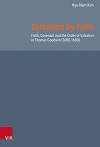 |
Hyonam Kim Salvation by Faith Faith, Covenant and the Order of Salvation in Thomas Goodwin (1600-1680) Vandenhoeck & Ruprecht, 2019, 306 Seiten, Hardcover, 978-3-525-56461-5 120,00 EUR |
Reformed Historical Theology
Volume 57 The doctrines of covenant, faith, and the order of salvation are crucial components of early modern Reformed soteriology. In seventeenth-century England, these three major doctrines of Reformed theology, which had been taken over undeveloped from the Reformers, took a mature shape, but aroused controversies among diverse Protestant groups. Modern historical scholarship on Reformed orthodoxy has produced little significant research that deals with these doctrines synthetically. This examination explores the broader role of faith in relation to these two significant doctrines for salvation in the early modern Reformed theology, with specific reference to the thought of Thomas Goodwin. To this end, Hyo-Nam Kim examines Goodwin’s life to review his religious experience and to understand his socio-theological context. Goodwin’s soteriology was sharpened by his battles on two fronts: The first is the threat of Arminian, Neonomian, and Socinian soteriologies that tended to place meritorious value on faith and on human acts. The second is the Antinomian errors that undervalued faith and human responsibility. Goodwin regarded faith as a key concept for his soteriology. Faith plays a central role in the covenant theology not only because a lack of faith was the immediate cause of breaking the covenant of works, but because saving faith was ordained in the covenant of redemption, and actually functions in the covenant of grace, as the instrument and a condition for the recovery of the relationship of mankind with God. Examination of Goodwin’s ordo salutis provides specific insight into the place and function of faith in the covenant of grace since each element of an ordo salutis refers to the blessings prepared for the elect to be finally saved. Together with the role of faith in Goodwin’s covenant theology, therefore, the reconstruction of Goodwin’s ordo salutis and the close examination of the role of faith in each blessing confirm that although faith may be said to be both an instrument and a condition for salvation, faith is the perfect instrument both for making salvation totally God’s gracious work, and for showing that the elect are not passive objects in the covenant. Leseprobe |
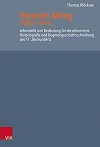 |
Thomas Klöckner Heinrich Alting (1583-1644) Vandenhoeck & Ruprecht, 2019, 431 Seiten, hardcover, 978-3-525-51699-7 110,00 EUR |
Reformed Historical Theology
Volume 56 Lebensbild und Bedeutung für die reformierte Historiografie und Dogmengeschichtsschreibung des 17. Jahrhunderts Die Vita Heinrich Altings stellt eine frühneuzeitliche Bildungsbiografie mit spannungsgeladenen Elementen und bedrohlichen Momenten dar. Dem kurfürstlichen Haus der Wittelsbacher in Heidelberg verdankte er den sozialen Aufstieg und die Begegnung mit führenden Persönlichkeiten der reformiert-transkontinentalen Welt. Nicht zuletzt war sein Zögling Friedrich V., der „Winterkönig“, eine schicksalhafte Figur, wie Alting selbst einräumt, im Rahmen der Formierung und des Zerfalls einer religiös-politisch motivierten Union und ihrer Expansion und Implosion. Es handelte sich für den friesischen Pastorensohn und reformierten Gelehrten um eine res publica litteraria im Wandel, die ihm Zugang zu namhaften Universitäten und wichtigen höfischen Anlässen verschaffte, aber auch seine Existenz und die seiner Angehörigen massiv bedrohen konnte. Der Ausbruch des Dreißigjährigen Krieges beförderte ihn ins Exil in die Niederlande. Dort entstanden seine Spätschriften von nachhaltiger Bedeutung. Leseprobe |
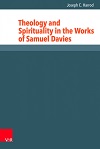 |
Joseph C. Harrod Theology and Spirituality in the Works of Samuel Davies Vandenhoeck & Ruprecht, 199 Seiten, Hardcover, 978-3-525-57314-3 89,00 EUR |
Reformed Historical Theology
Volume 55 From his death in 1761 through the American Civil War, Samuel Davies was a recognized name among American Presbyterians, yet for more than a century he has remained far more obscure in discussions of American religion. During the mid-Eighteenth Century, New Side Presbyterian evangelist and preacher Samuel Davies was a pioneer for religious toleration in Colonial America, yet to date no single work has examined Davies’ vision for the interior life. Theology and Spirituality in the Works of Samuel Davies is the first monograph-length analysis of Davies’ conception of Christian spirituality. After a decade of pastoral ministry to congregations in Virginia, Davies followed eminent American theologian Jonathan Edwards as the fourth President of the College of New Jersey (Princeton University), a tenure cut short by his early death at age thirty-seven. J.C. Harrod examines various aspects of Davies’ own personal piety as well as the place that Scripture, conversion, holiness, and the means of grace played in his formulation of Christian piety. Leseprobe |
 |
John H. Duff A Knot Worth Unloosing The Interpretation of the New Heavens and Earth in Seventeenth-Century England Vandenhoeck & Ruprecht, 2018, 256 Seiten, hardcover, 978-3-525-57061-6 95,00 EUR |
Reformed Historical Theology
Volume 53 In the study of Christian eschatological thought, virtually no attention has been given to past interpretations of the biblical phrase the new heavens and earth. John Duff uncovers the interpretations of this phrase that were extant in seventeenth-century England. These interpretations fall into two basic camps—those that understood the phrase metaphorically and those that understood the phrase literally.Some English divines believed the new heavens and earth referred to the new age of the gospel that commenced in the first century CE. At that time, God flung open the doors of salvation to Gentiles while at the same time bringing judgment to the Jewish nation for its failure to recognize and embrace Jesus as Messiah. This epic transition was fittingly described as a new heavens and earth.A second group of English interpreters believed the phrase stood for a yet future time when the political and religious circumstances of the world would change for the betterment of the church for one thousand years. The new heavens and earth stood for a future millennium in which Christ would establish his reign over the world prior to the day of resurrection and final judgment. Theologians who accepted a literal understanding believed the new heavens and earth described the renovation of the physical creation at the final judgment. Among this group, differences of opinion existed with respect to how much of the world would need cleansing, what creatures would be restored and of what use would a renovated world serve. The idea that the earth, and not heaven, would be the final abode of the saints emerged among a few obscure writers. Leseprobe |
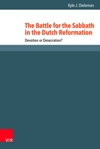 |
Kyle J. Dieleman The Battle for the Sabbath in the Dutch Reformation Devotion or Desecration? Vandenhoeck & Ruprecht, 2018, 256 Seiten, hardcover, 978-3-525-57060-9 95,00 EUR |
Reformed Historical Theology
Volume 52 Kyle J. Dieleman focuses on the doctrinal and practical importance of Sunday observance in the early modern Reformed communities in the Low Countries. My project investigates the theological import of the Sabbath and its practical applications. The first step is to focus on how Dutch Reformed theologians conceived of the Sabbath. The theology of the Sabbath, I argue, moves over time from an emphasis on spiritual rest to participating in the ministries of the church to a strict rest from all work and recreation. The next step is to explore congregants’ actual Sunday practices. By attending to church governance records at the national, regional, and local levels the importance of proper Sabbath observance quickly becomes clear. The provincial synod records, classes’ records, and consistory records indicate that church authorities were adamant that church members faithfully attend sermon and catechism services, refrain from sinful practices, and abstain from recreational activities. Equally as telling as the observance demanded of church members is how church authorities responded. The church records portray these authorities as fretting over the disordered and unregulated nature of improper Sabbath observance. Having established the importance of the Sabbath in Dutch Reformed theology and lived piety, I argue the emphasis on Sunday observance is best understood as resulting from two main factors. First, the emphasis on proper Sunday observance is a result of the Reformed church authorities attempting to maintain the pious reputation of the Reformed faith and establish the identity of the Reformed Church amid multiple other confessional identities. Second, proper observance of the Sabbath was important because it ensured order within the church and society more broadly. Leseprobe |
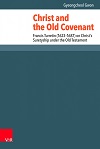 |
Gyeongcheol Gwon Christ and the Old Covenant Vandenhoeck & Ruprecht, 162 Seiten, hardcover, 978-3-525-51641-6 85,00 EUR |
Reformed Historical Theology
Volume 51 Francis Turretin (1623–1687) on Christ’s Suretyship under the Old Testament This study explores the Cocceian-Voetian debate through the eyes of Francis Turretin (1623–1687). There is a dearth of research on Turretin’s take on this debate, the author will parse out how Turretin adheres to the Voetianism of the Utrecht theologian Melchior Leydekker (1642–1721) while remaining conciliatory to the Cocceians. With Leydekker, Turretin argues that Christ’s suretyship in the Old Testament is identical to what it is in the New Testament. As the Father decrees that Christ is the most perfect and certain fulfiller of God’s promise, the ancients benefit from Christ’s sacrifice as much as do the saints in the New. The sins of the elect must be fully forgiven regardless of the progress of redemption in history, for the faithful both in the Old and the New are saved by the same grace of Christ, the expromissor. At the same time, not only does Turretin leave out some of the controversial issues between the two parties, but he also tends to neutralize Leydekker’s acid criticism of the extreme form of Cocceianism. This conciliatory gesture indicates that Turretin does not consider Cocceianism his archenemy. Seen in this light, Turretin can be viewed as a moderate and peaceful Voetian. Leseprobe |
 |
Kai-Ole Eberhardt Christoph Wittich (1625–1687) Reformierte Theologie unter dem Einfluss von René Descartes Vandenhoeck & Ruprecht, 2018, 512 Seiten, Hardcover, 978-3-525-55283-4 150,00 EUR |
Reformed Historical Theology
Volume 47 Sprache: Deutsch Die epochale Bedeutung des Denkens von René Descartes ist für die Philosophie- und Geistesgeschichte der Neuzeit unbestritten. In welch hohem Maße auch die reformierte Theologie die neue Philosophie des 17. Jahrhunderts aufgenommen und diskutiert hat, zeigt Kai-Ole Eberhardts Analyse von Leben und Werk des Theologieprofessors Christoph Wittich. Wittich repräsentiert eine Gruppe von Gelehrten, die von der Bedeutung Descartes' zutiefst überzeugt waren und sich gegen großen Widerstand aus Kirche und Theologie für die Rezeption des cartesianischen Wissenschafts- und Weltbildes eingesetzt haben. Der Verlauf von Wittichs Karriere, ausgehend von seinem Studium in den Niederlanden über Professuren in Herborn, Duisburg, Nijmegen und Leiden, illustriert die Entstehung eines cartesianischen Gelehrtennetzwerkes und dessen Auseinandersetzungen mit Vertretern einer anticartesianischen Theologie. Eine detaillierte Analyse der Hauptwerke Wittichs gewährt Einblicke in die Entstehung einer Theologie, die sowohl beansprucht, reformiert-orthodox zu sein als auch dem modernen Wissenschaftskonzept des Cartesianismus zu entsprechen. |
 |
Jae-Eun Park Driven by God Active Justification and Definitive Sanctification in the Soteriology of Bavinck, Comrie, Witsius, and Kuyper Vandenhoeck & Ruprecht, 2018, 264 Seiten, hardcover, 978-3-525-55284-1 110,00 EUR |
Reformed Historical Theology
Volume 46 Sprache: Englisch For more than two millennia believers have struggled with the antinomy of God's absolute sovereignty over and man's ultimate responsibility in justification and sanctification. Theologians have used some version of the terms »active justification« and »definitive sanctification« in an attempt to illuminate this mystery. However, in the past decade scholars have begun to criticize these concepts, saying that they are unsupported in Scripture, lead to theological confusion, and are of no practical benefit to believers.Through the work of theologians from the broader Dutch Reformed tradition, especially Herman Bavinck, Alexander Comrie, Herman Witsius, and Abraham Kuyper. Jae-Eun Park demonstrates that the terms »active justification« and »definitive sanctification« are derived from Scripture and serve to clarify, not obscure the doctrines of justification and sanctification. In addition, the book shows that neglect, misuse, or misunderstanding of the terms have resulted in contemporary criticisms that are unconvincing and unfounded.Writings of the aforementioned theologians define and expound four characteristics held in common between active justification and definitive sanctification, i.e., inseparability, objectivity and decisiveness, Christ-centeredness, and God's absolute sovereignty – concepts of the mentioned theologians. All four characteristics of active justification and definitive sanctification emphasize the »God-driven« nature of salvation.Jae-Eun Park explains how – when properly defined and presented – the two terms are important theologically, bringing clarity to the issue of the perfect balance between God's sovereignty and human responsibility in salvation. He also shows how active justification and definitive sanctification offers practical assurance of their perseverance unto glory to true believers, and provides pastors with an invaluable tool for exhorting parishioners who may have lapsed into either triumphalism or defeatism. |
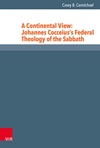 |
Casey B. Carmichael A Continental View: Johannes Cocceius’s Federal Theology of the Sabbath Vandenhoeck & Ruprecht, 2018, 192 Seiten, hardcover, 978-3-525-55278-0 95,00 EUR |
Reformed Historical Theology
Volume 41 Sprache: Englisch Carmichael argues that Johannes Cocceius’s theology of the Sabbath serves as a window through which one can view more clearly his federal theology or covenant theology. Covenant theology was the most distinctive feature of his theology. Moreover, Cocceius spent a notable portion of his life engaging in the Leiden Sabbath Controversies from 1655 to 1659, which played a key role in the split of the Reformed Dutch Republic into two socio-political blocs—Cocceians and Voetians. So far scholars have tended to overlook this critical phase in Cocceius’s theological development. Carmichael sheds light on it by looking at the theological texts that Cocceius wrote that absorbed his attention during this significant period. Casey Carmichael examines first the evolution of the problem of the Sabbath in Cocceius’s theological tradition—Reformed Orthodoxy—in Chapters 2–4 and second the development of Cocceius’s doctrine of the Sabbath, structured around the Leiden Sabbath Controversies, in Chapters 5–8. |
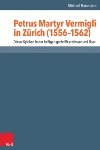 |
Michael Baumann Petrus Martyr Vermigli in Zürich (1556–1562) Dieser Kylchen in der heiligen gschrifft professor und läser Vandenhoeck & Ruprecht, 2016, 457 Seiten, hardcover 978-3-525-55099-1 160,00 EUR |
Reformed Historical Theology
Volume 36 Michael Baumann untersucht die letzte und produktivste Phase des italienischen Reformators Peter Martyr Vermigli (1499-1561) als Hochschullehrer in Zürich. Von 1556 bis 1561 unterrichtete dieser als Professor Altes Testament. Peter Martyr Vermigli war als scholastischer Theologe ein explizit reformierter Denker, er kombinierte reformierte Glaubenslehre mit scholastischer Argumentation und leistet damit Entscheidendes zur Etablierung und Sicherung der noch jungen (protestantischen) reformierten Kirche. Vermigli trug entscheidend zur Präzisierung des reformierten Abendmahlsverständnisses bei, indem er im sog. Zweiten Abendmahlsstreit vehement gegen die lutherische Position die oberdeutsch-reformierte stärkte. Als Kontroverstheologe verhalf er dem Consensus Tigurinus, also der Schweizer Übereinkunft über das Abendmahl zur Bekanntheit und zum Durchbruch. Er stand als hochgebildeter Theologe mit großer Hochschulerfahrung für eine weit über Zürich hinaus reichende Wirkung der jungen Zürcher Hohen Schule und verhalf der schola tigurina zu überregionaler Bedeutung und Relevanz. Keine andere Lehrperson verkörperte wie Peter Martyr diese Internationalität, nicht nur als Kirchendiplomat, mehr noch als persönlicher Gewährsmann war Vermigli für Heinrich Bullinger die Verbindung nach England und zu Johannes Calvin nach Genf. Die Arbeit konzentriert sich auf drei Bereiche: einen historio-biographischen, der die letzten Jahre Vermiglis in Zürich beleuchtet und beschreibt; einen exegetisch-theologiehistorischen, in welchem anhand edierter Vorlesung aus der Zürcher Zeit Vermigli als ein spätmittelalterlich-scholastisch geschulter, aber durchwegs biblisch-reformiert argumentierender Theologe dargestellt wird; und auf einen dritten Bereich, in welchem anhand des Versuchs einer Rezeptionsgeschichte die Wirkung Vermiglis auf die spezifisch zürcherischen Kirchenentwicklungslinien beschrieben werden. Inhaltsverzeichnis und Leseprobe |
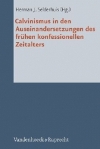 |
Volker
Leppin Calvinismus in den Auseinandersetzungen des frühen konfessionellen Zeitalters Vandenhoeck & Ruprecht, 2013, 184 Seiten, Gebunden, 978-3-525-55050-1 100,00 EUR |
Reformed Historical Theology
Band 23 Das Calvin-Jahr 2009 gehörte zu den wichtigsten Ereignissen im Vorfeld des großen Reformationsjubiläums 2017: Eindrücklich wies es darauf hin, was die Reformation alles ist: international, ökumenisch, facettenreich – und mehr als nur ein Martin Luther mit Umfeld. In den Beiträgen dieses Bandes steht das Moment der Auseinandersetzung des Luthertums mit dem entstehenden Calvinismus im Vordergrund, sowohl in historischer als auch in systematisch-theologischer Perspektive. Das Phänomen eines Calvinismus, der überhaupt erst durch gegenseitige Ausgrenzungsprozesse entstand, beleuchten die Beiträge aus unterschiedlichen Blickwinkeln. Damit erscheint letztlich auch die Ordnungskategorie „Konfession“ noch einmal als historisch variable Größe. Die Beiträge wurden verfasst von Irene Dingel, Matthias Freudenberg, Wim Janse, Robert Kolb, Martin Leiner, Volker Leppin und Herman Selderhuis. Volker Leppin, geb. 1966, ist Professor für Kirchengeschichte in Jena. Herman J. Selderhuis, geb. 1961, ist Professor für Kirchengeschichte und Kirchenrecht an der Theologischen Universität Apeldoorn und Direktor des Instituts für Reformationsforschung. |
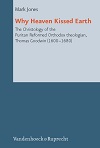 |
Mark Jones Why Heaven Kissed Earth Vandenhoeck & Ruprecht, 2010, 285 Seiten, Gebunden 978-3-525-56905-4 120,00 EUR |
Reformed Historical Theology
Band 13 The Christology of the Puritan Reformed Orthodox theologian, Thomas Goodwin (1600-1680) In short, the central argument of this study posits that Goodwin’s Christology is grounded in, and flows out of, the eternal covenant of redemption, also known as the pactum salutis or »counsel of peace«. That is to say, his Christology does not begin in the temporal realm at the incarnation, but stretches back into eternity when the persons of the Trinity covenanted to bring about the salvation of fallen mankind. Goodwin’s Christology moves from the pretemporal realm to the temporal realm with a decidedly eschatological thrust, that is, with a view to the glory of the God-man, Jesus Christ. What this work does is connect two vital aspects of Reformed theology, namely, the doctrine of Christ and the concept of the covenant. The findings of this study show that, for Goodwin, Christ is the Christ of the covenant. Mark Jones, PhD, ist Wissenschaftlicher Mitarbeiter an der Theologischen Fakultät der University of the Free State, Bloemfontein, Südafrika. |
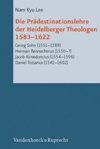 |
Nam Kyu Lee Die Prädestinationslehre der Heidelberger Theologen 1583-1622 Georg Sohn (1551-1589), Herman Rennechenus (1550-?), Daniel Tossanus (1541-1602) Vandenhoeck & Ruprecht, 2010, 211 Seiten, Gebunden, 978-3-525-56870-5 140,00 EUR |
Reformed Historical Theology
Band 10 Sprache: Deutsch Die Zeit von 1583 bis 1622 ist für Heidelberg eine Periode des Streites, besonders zwischen Reformierten und Lutheranern. Neben der Abendmahlslehre steht die Prädestinationslehre im Zentrum der Auseinandersetzungen. Die reformierten Heidelberger Theologen sahen diese Lehre nicht als spekulatives Modethema an, sondern als die Grundlage für Trost und Gewissheit, so wie es sich auch in den Dordrechter Canones findet. Nam Kyu Lee behandelt vier, ausgewählte Heidelberger Theologen; Georg Sohn (1551–1589), Herman Rennecherus (geb. 1550), Jakob Kimedoncius (1554–1596), Daniel Tossanus (1541–1602). Die Lehre Georg Sohns hat dogmengeschichtlich eine besondere Bedeutung. Untersucht sind seine seelsorgerliche Motivation, seine Lehre und deren Struktur, sowie die Spuren Melanchthons, die sich in seinen Ansichten wieder finden. Herman Rennecherus betont durch seine Goldene Kette des Heils die seelsorgerliche Bedeutung der Prädestinationslehre. Hierbei ist auch darauf hinzuweisen, dass seine goldene Kette dem Werk Golden Chain von William Perkins vergleichbar ist und anhand dessen der Unterschied in der Entwicklung der Heilsordnung zwischen Großbritannien und dem europäischen Festland deutlich wird.Jacob Kimedoncius geriet mit Samuel Huber, der schon einige Bücher gegen die Heidelberger Theologen geschrieben hatte, in heftigen Streit darüber, für wen Christus gestorben sei. Daniel Tossanus behandelt nicht nur die Behauptungen der Scholastiker und der Lutheraner, sondern auch die Verschiedenheit zwischen Melanchthon und Genf und ferner zwischen verschiedenen Heidelberger Theologen. Er vergleicht den so genannten Supralapsarismus mit dem Infralapsarismus und stellt sich selbst dabei als Supralapsarianer heraus. zur Seite Heidelberger Katechismus |
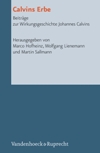 |
Marco Hofheinz Calvins Erbe Beiträge zur Wirkungsgeschichte Johannes Calvins Vandenhoeck & Ruprecht, 2011, 386 Seiten, Gebunden, 978-3-525-56919-1 120,00 EUR |
Reformed Historical Theology
Band 9 Johannes Calvin (1509–1564) inspiriert bis heute das gesellschaftliche, kulturelle, politische und wirtschaftliche Leben. Gleiches gilt für den von seinen Lehren ausgehenden sogenannten Calvinismus, der eine große Breitenwirkung entwickelt hat. Der Einfluss Calvins äußert sich in den verschiedensten Formen. Wie er zu bewerten ist, ist häufig umstritten.»Calvins Erbe« begibt sich auf die Suche nach den Wirkungen des Reformators in der Geistes- und Kulturgeschichte Westeuropas und Nordamerikas. Geistesgeschichtliche Strömungen, kirchliche Gruppen und theologische Richtungen werden daraufhin befragt, wie sie Calvins Gedanken rezipiert haben, wie sie diese gegebenenfalls weiterentwickelt oder neue Akzente gesetzt haben. Behandelt werden der monarchomachische Widerstandsdiskurs des 16. Jahrhunderts, die Föderaltheologie der reformierten Orthodoxie, die Bezüge des Calvinismus zu Puritanismus und Pietismus, Calvins Wirkungen in der neuen Welt, der Neocalvinismus und die Calvinrezeption im Katholizismus. Es wird diskutiert, wie sich das Verhältnis F. D. E. Schleiermachers und Karl Barths zu Calvin beschreiben lässt. Der Band beschäftigt sich auch mit kontroversen Themen wie Calvinismus und Kapitalismus in Gestalt der sogenannten »Weber-These«, Calvinismus und Demokratie oder Calvinismus und die ökumenische Bewegung des 20. Jahrhunderts. Darüber hinaus wir die Entwicklung des reformierten Verständnisses der Kirche im Blick auf die Entstehung der sogenannten presbyterial-synodalen Ordnung analysiert. |
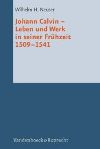 |
Wilhem H. Neuser Johannes Calvin – Leben und Werk in seiner Frühzeit 1509-1541 Vandenhoeck & Ruprecht, 384 Seiten, Gebunden, 978-3-525-56915-3 81,95 EUR |
Reformed Historical Theology
Band 6: Studienband über Johannes Calvin. Wilhelm Neuser studiert in diesem Band die Persönlichkeit und das Werk von Johannes Calvin in seinen jungen Jahren. An erster Stelle skizziert er den ideologischen Kontext des Reformators. Danach stellt er auf integrierende Weise die verschiedenen Zusammenhänge des Lebens von Calvin dar: seine Jugendzeit und Studium an der Artistenfakultät in Paris (1509–1528), sein Jurastudium und seine humanistische Studien (1528–1532), die reformatorische Bewegung in Paris, die Ereignisse von Paris und Calvins Reisen im Jahr 1534, seine Anfänge als Wegbereiter und Verteidiger der Reformation im Jahr 1535, seine Mitarbeit an der Olvétanbibel, seine Verteidigungsschrift an König Franz I, die Institutio , der erster Genfer Aufenthalt und sein Aufenthalt in Straßburg (1538–1541). Neuser analysiert besonders eingehend Calvins Predigten, Predigtentwürfe und sein gesamtes literarisches Werk. Er fokussiert auch die Personen und die Ideen, die sich einflussreich auf Calvin auswirkten und gibt auch die Quellen für eine Vita Calvini (bis 1538) detailliert an. |
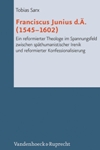 |
Tobias Sarx Franciscus Junius d. Ä. (1545-1602) Ein reformierter Theologe im Spannungsfeld zwischen späthumanistischer Irenik und reformierter Konfessionalisierung Vandenhoeck & Ruprecht, 978-3-525-56912-2 85,00 EUR |
Reformed Historical Theology
Band 3 Franciscus Junius d.Ä. (1545-1602) war einer der führenden Vertreter der dritten Generation reformierter Theologen. Bei Johannes Calvin und Theodor Beza in Genf ausgebildet, wurde er Theologieprofessor in Heidelberg und später in Leiden. Nicht nur der Unterricht in Genf, sondern auch die juristischen und humanistischen Studien in Bourges und Lyon haben Junius geprägt, sodass er ein unverkennbar reformiertes, aber in vielerlei Hinsicht von Calvin und Beza abweichendes theologisches Profil entwickelt hat. In Fragen nach politischer und kirchlicher Ordnung hat Junius sich stark für die Geltung von menschlichen Grundrechten unabhängig eines religiösen Bekenntnisses eingesetzt und einen religiösen Pluralismus staatlichen Zwangsmaßnahmen vorgezogen. Mehrfach sind Friedensinitiativen zur Versöhnung der Konfessionen sowie zur Befriedung von politischen Gemeinwesen von ihm ausgegangen. Ansätze eines Vernunftrechts sowie hermeneutische Überlegungen über die Rolle der Bibel für Rechtsprechung und Politik haben bekannte Gelehrte wie Hugo Grotius und Johannes Althusius inspiriert und damit auch eine außertheologische Rezeption von Junius’ Schriften bewirkt.Die Untersuchung zeigt, dass ein entschiedenes Eintreten für den reformierten Glauben nicht unbedingt verbunden war mit Polemik gegenüber anderen Konfessionen. Eine bislang fehlende, im wesentlichen chronologisch gegliederte Übersicht über Junius’ theologisches Gesamtwerk eröffnet die Möglichkeit, Junius als einen bedeutenden reformierten Theologen des ausgehenden 16. Jahrhunderts wahrzunehmen. Durch die Einordnung von Junius’ Gedanken in seine Zeit, ist die Arbeit ein wichtiger Beitrag zur Forschung über die Pluralität calvinistisch-reformierter Theologie am Ende des 16. Jahrhunderts. |